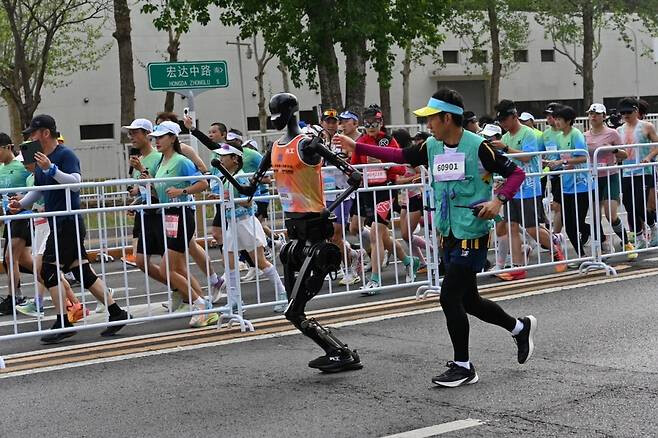
Beijing, China – Building on its recent hosting of the world's first humanoid robot half marathon, the city of Beijing is set to further solidify its position at the forefront of the burgeoning humanoid robotics industry by hosting a dedicated humanoid robot sports competition this August. This event, announced by Beijing authorities, underscores China's ambitious drive to become a global leader in this cutting-edge technological domain, backed by increasing government support for the sector.
Scheduled to take place from August 15th to 17th, the Humanoid Robot Sports Competition will utilize the iconic National Stadium, famously known as the "Bird's Nest," and the speed skating venue from the 2022 Winter Olympics. The diverse range of events planned for the competition highlights the multifaceted capabilities that are being developed in humanoid robots. Spectators can expect to witness robots competing in athletic disciplines such as track and field, showcasing their locomotion and agility. Team sports will also feature prominently, with humanoid robots engaging in soccer matches, testing their coordination and strategic decision-making.
Beyond traditional sports, the competition will also include events that demonstrate the practical applications of humanoid robots in various industries. These include dance performances, highlighting the robots' dexterity and ability to execute complex movements; logistics transportation challenges, assessing their navigation and load-carrying capacities; and medicine sorting tasks, demonstrating their precision and object recognition skills. Adding to the spectacle, side events such as badminton, table tennis, and basketball are also on the agenda, promising a comprehensive showcase of robotic athleticism and skill.
The Humanoid Robot Sports Competition will be preceded by the prestigious World Robot Conference, scheduled from August 8th to 12th. This major industry event will draw approximately 200 companies from around the globe, providing a platform to unveil their latest advancements, research findings, and innovative applications in robotics. The co-location of these two events in Beijing signifies the city's commitment to fostering a vibrant ecosystem for robotics research, development, and application.
While Beijing has touted its upcoming sports competition as the world's first of its kind, it's important to note that a similar robot sports competition was held in Wuxi, Jiangsu Province, from April 24th to 26th. This prior event suggests a growing trend within China to utilize competitive platforms as a means of showcasing and advancing robotic capabilities.
The announcement of the August games follows Beijing's successful hosting of the world's first humanoid robot half marathon on April 19th in the Yizhuang Economic and Technological Development Zone. This groundbreaking event saw 21 humanoid robots participating alongside human runners, albeit on a separate track. The "Tiangong Ultra," developed by the Beijing Humanoid Robot Innovation Center, emerged victorious in the robotic category, completing the 21.0975-kilometer distance in an impressive 2 hours, 40 minutes, and 42 seconds. This achievement underscored the rapid progress being made in the locomotion and endurance of humanoid robots.
These robotic sporting events are not merely novelty spectacles; they serve as crucial testing grounds for the capabilities of humanoid robots. The challenges inherent in athletic competitions – such as balance, speed, agility, coordination, and environmental adaptation – push the boundaries of current robotic technology. The data and insights gleaned from these events can significantly contribute to advancements in areas such as motor control, artificial intelligence, sensor integration, and power management for humanoid robots.
China has made no secret of its ambition to become a dominant force in the global robotics market, particularly in the realm of humanoid robots. The government has outlined strategic plans and provided substantial funding to support research, development, and manufacturing in this sector. Humanoid robots are seen as a key component of China's future industrial landscape, with potential applications spanning manufacturing, healthcare, logistics, and even elder care.
The hosting of these high-profile robotic events in Beijing serves multiple strategic purposes. Firstly, it raises public awareness and generates excitement surrounding robotics, potentially inspiring the next generation of scientists and engineers. Secondly, it provides a platform for Chinese researchers and companies to showcase their technological prowess on a global stage, fostering international collaboration and competition. Thirdly, it drives innovation by creating challenging benchmarks and encouraging rapid advancements in robotic capabilities.
The development of sophisticated humanoid robots requires significant breakthroughs in various fields, including artificial intelligence for autonomous decision-making, advanced materials for lightweight and durable construction, sophisticated sensors for environmental perception, and efficient power sources for extended operation. The competitive environment of robotic sports can act as a catalyst for innovation in these crucial areas.
While the field of humanoid robotics is still in its relatively early stages of development compared to industrial robots, the rapid progress demonstrated in events like the Beijing half marathon and the upcoming sports competition indicates the accelerating pace of innovation. As humanoid robots become more capable and versatile, their potential to transform various aspects of society and the economy will continue to grow.
Beijing's commitment to hosting these pioneering robotic sporting events underscores China's strategic vision and determination to be at the forefront of the humanoid robot revolution. By providing a platform for showcasing technological advancements and fostering a competitive spirit, these events are likely to play a significant role in driving innovation and shaping the future of this transformative technology. The world will be watching closely as these metallic athletes take to the track and field, offering a glimpse into the exciting possibilities of human-robot interaction and the future of robotics.
[Copyright (c) Global Economic Times. All Rights Reserved.]






























